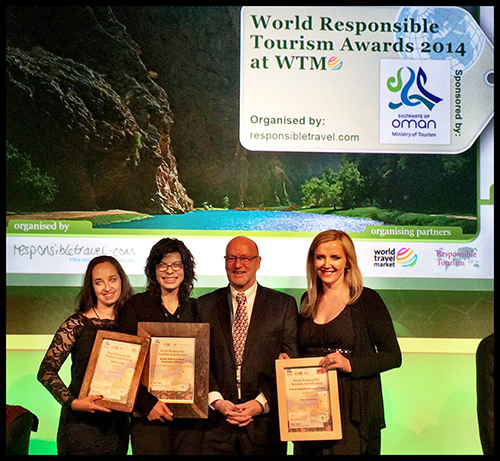As Garry Wilson, Mainstream Product & Purchasing Director for the TUI Group, argues in the above video, in an interview specially recorded for Cape Town and Africa, Responsible Tourism is now core, mainstream business for TUI. The principles of Responsible Tourism, of all stakeholders taking responsibility for making better tourism, are important to TUI, to hotels and incoming operators, to outbound operators in a growing number of markets and to local communities. Over the last 20 years Responsible Tourism, taking responsibility for making tourism sustainable, has become mainstream for TUI, for ABTA, for WTM, for a host of destinations and for local communities and travellers.
The judges meet this Monday in Cape Town to decide on the winners of the African Responsible Tourism Awards being presented at WTM Africa on Thursday. There are over 50 tourism organisations, initiatives, businesses and projects across seven categories, on the long list including wildlife conservation, poverty reduction, best destination, resource management and best blog. There were over 120 submissions from all corners of Africa – covering the continent north to south and east to west. The list includes nominees from Morocco, the Gambia, Mozambique, Kenya, Tanzania, Botswana, South Africa and many more.
 Sponsored by WESGRO and organised by the International Centre for Responsible Tourism – South Africa, the awards are part of a family of regional Responsible Tourism Awards organised by Responsible Travel.
Sponsored by WESGRO and organised by the International Centre for Responsible Tourism – South Africa, the awards are part of a family of regional Responsible Tourism Awards organised by Responsible Travel. 
The growing family of Responsible Tourism Awards culminate each year with the World Responsible Tourism Awards which are presented at WTM in London on World Responsible Tourism Day in November – the winners in the African Awards will automatically proceed to the long list for the World Responsible Tourism Awards.

This Tuesday sees the opening of the 11th International Conference on Responsible Tourism in Destinations in Cape Town, 13 years on since the conference series was born in the city. Cape Town was an early pioneer in Responsible Tourism and in 2009 adopted a charter and a plan to secure progress. We’ll be hearing during the conference about what progress has been made over the last six years. The conference is co-located with WTM Africa with panels on inclusive tourism and designing tourism products that benefit destinations. One of the core themes is using tourism to benefit the people whose home the destination is and their cultural and natural heritage. We are also looking at marketing and resource efficiency in a continent facing drought and climate change. This is about more than just the bottom line. In WTM Africa, there are panels about why Responsible Tourism matters, resource efficiency and the commercial advantage. Responsible Tourism makes business sense as well as contributing – in the words of the 2002 Cape Town declaration – to “making better places for people to live in and better places for people to visit”.

